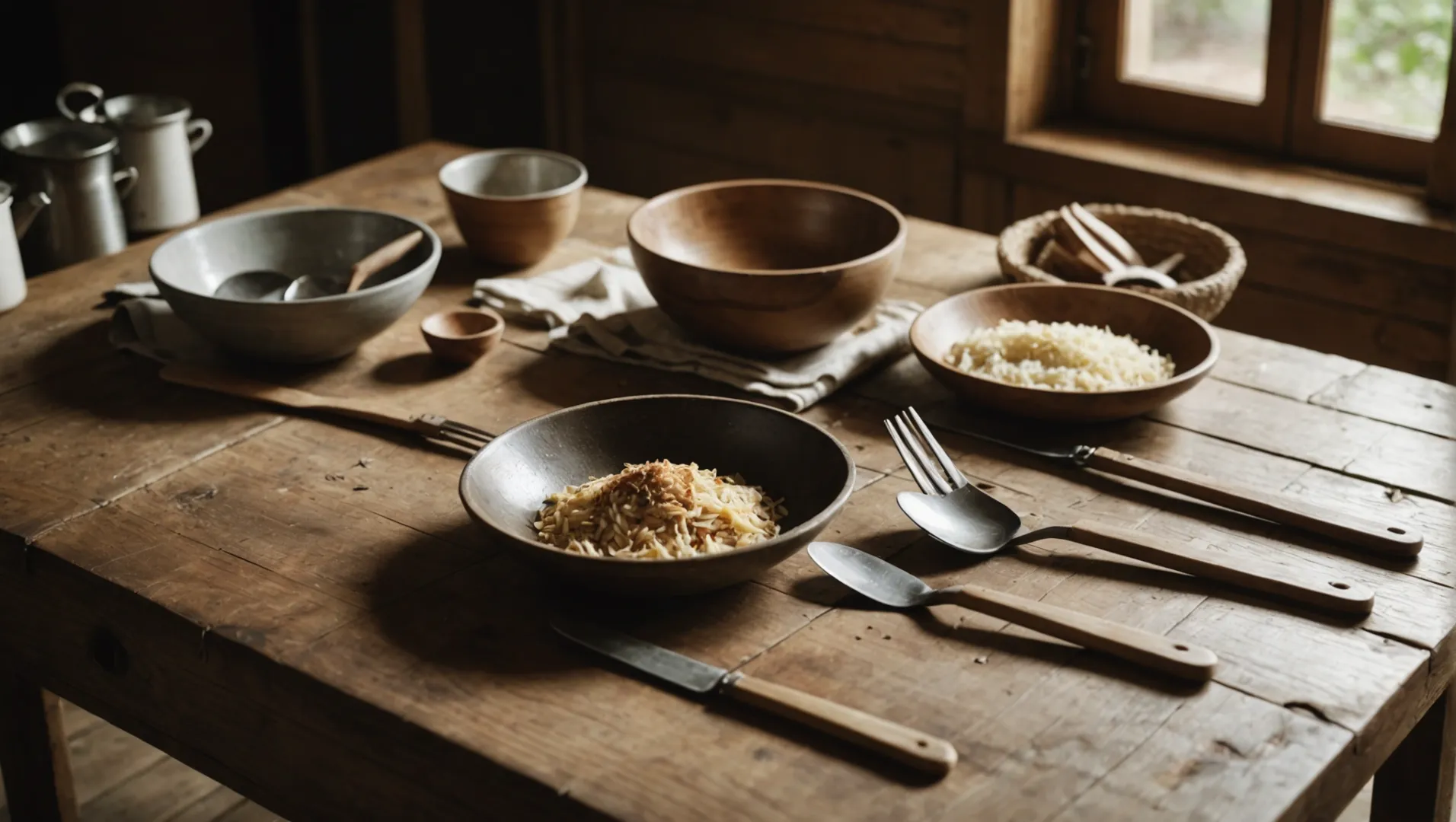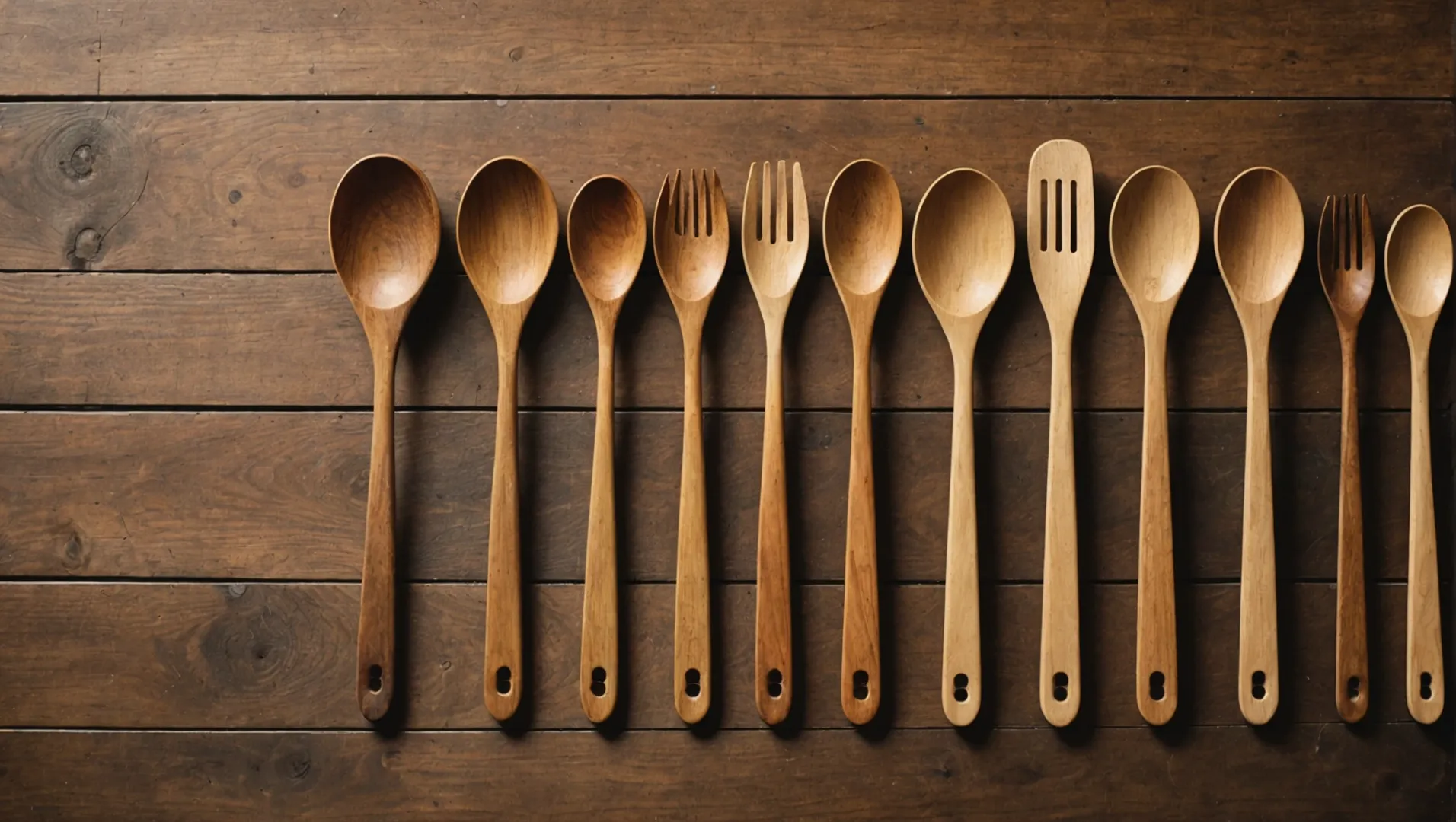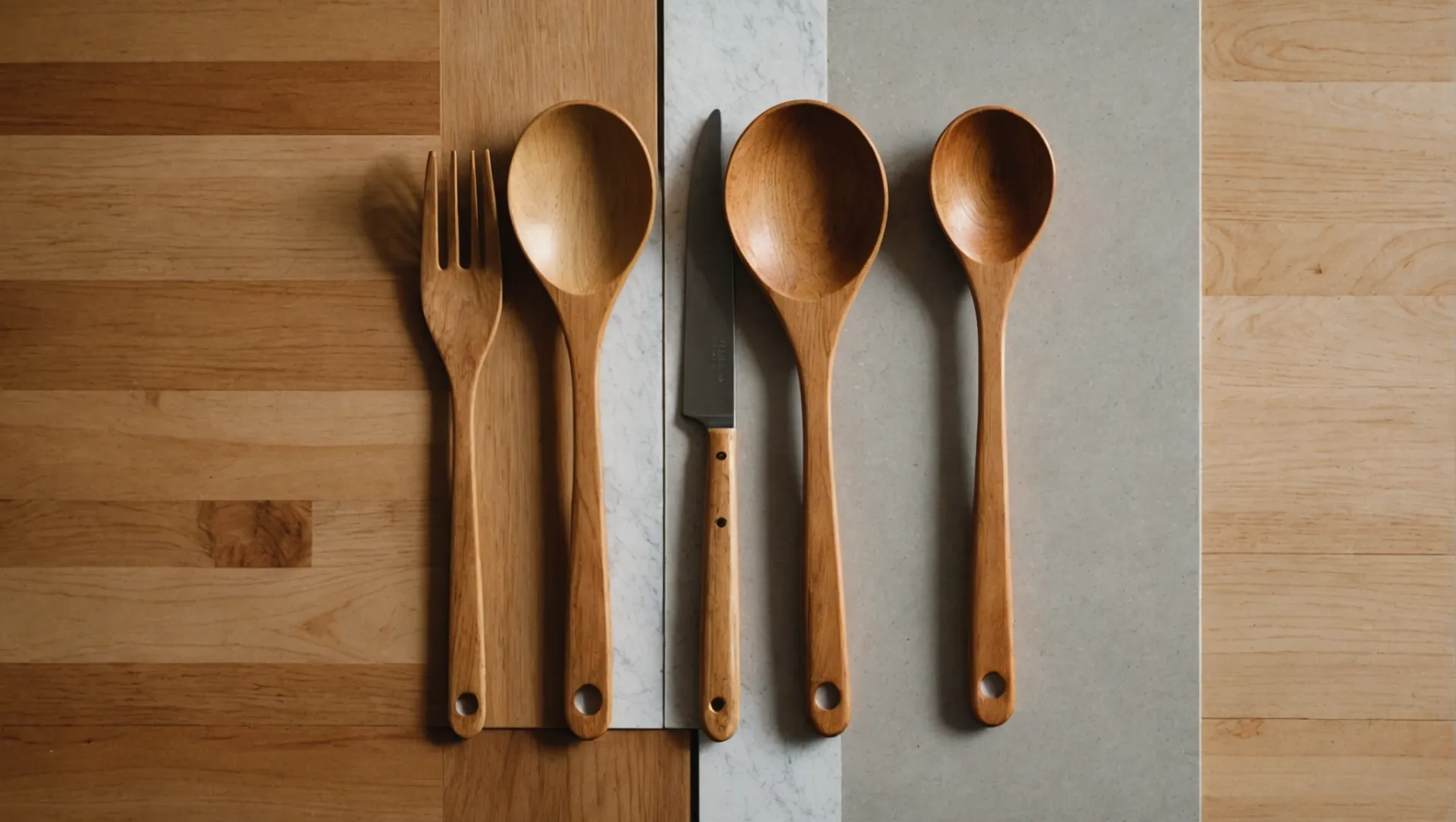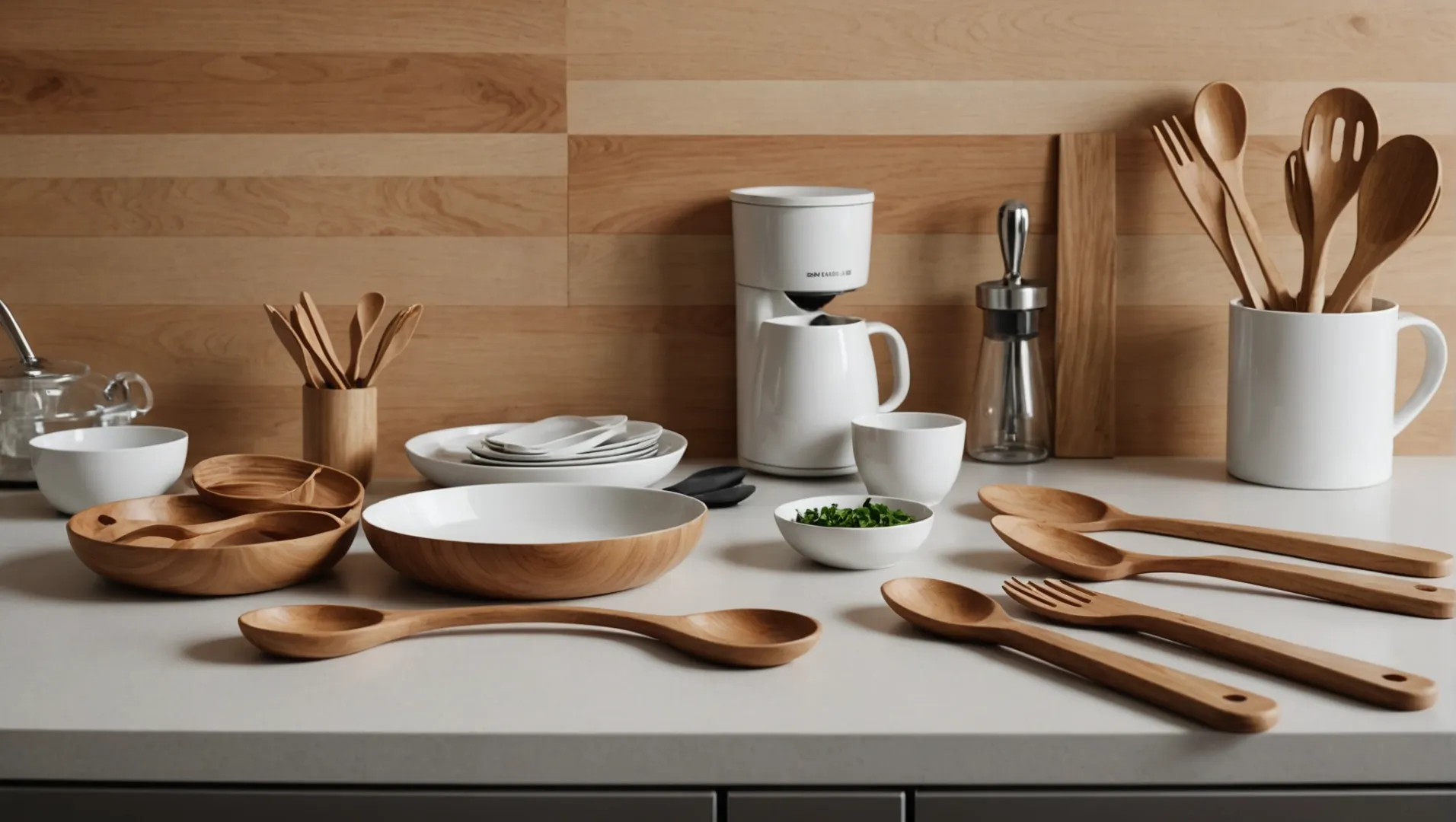
Let's talk about a simple change that can have a big impact on our planet—switching to wooden utensils!
Wooden utensils are better for the environment due to their biodegradability and renewable sourcing. Unlike plastic, they decompose quickly and can be sustainably produced from responsibly managed forests, reducing waste and environmental impact.
But there's more to wooden utensils than just being eco-friendly. Let’s dive deeper into their lifecycle, maintenance, and how they stack up against plastic alternatives.
Wooden utensils are biodegradable and decompose quickly.True
Wooden utensils break down naturally in months, unlike plastic which takes centuries.
What Makes Wooden Utensils Environmentally Friendly?
Wooden utensils are a sustainable kitchen staple, but what makes them truly eco-friendly?
Wooden utensils are environmentally friendly because they are made from renewable resources and are biodegradable. They minimize waste and environmental harm compared to plastic, which takes centuries to decompose. Responsible sourcing and natural coatings further enhance their eco-friendliness.

The Lifecycle of Wooden Utensils
The journey of a wooden utensil begins in responsibly managed forests, where trees are harvested sustainably. This ensures that the natural habitat is preserved, and new trees are planted to replace those cut down. This cycle not only supports the environment but also the communities involved in forest management.
Once the wood is harvested, it's crafted into utensils using minimal energy compared to the production of plastic cutlery. The manufacturing process often employs techniques that limit waste and pollution. For instance, any leftover wood can be repurposed or composted, reducing the overall environmental footprint.
Biodegradability and Composting Benefits
One of the standout features of wooden utensils is their biodegradability. Unlike plastic, which can linger in landfills for hundreds of years, wooden utensils break down naturally in a matter of months when composted correctly. This significantly reduces waste and helps maintain healthier ecosystems.
Composting wooden utensils is straightforward. After their lifecycle, they can be added to a compost bin where they will decompose, returning nutrients to the soil. This contrasts starkly with plastic cutlery, which contributes to pollution and poses a threat to wildlife.
Non-Toxic and Natural Coatings
Another reason wooden utensils are environmentally friendly is the use of non-toxic coatings. Many manufacturers apply food-safe oils or waxes, such as beeswax or linseed oil, to protect the wood and enhance its durability. These natural coatings not only safeguard the utensils from moisture but also ensure they remain safe for both users and the environment.
Using non-toxic coatings also means that when wooden utensils do break down, they do not release harmful chemicals into the soil, unlike some plastics that can leach toxins over time.
The Importance of Responsible Sourcing
To truly understand why wooden utensils are environmentally friendly, one must consider the source of the wood. Ethical manufacturers prioritize sourcing wood from certified forests1 that adhere to strict sustainability standards. This includes ensuring that logging practices do not harm ecosystems and that workers are treated fairly.
By choosing wooden utensils from responsible sources, consumers support practices that prioritize environmental health and social responsibility.
In conclusion, while wooden utensils offer clear environmental advantages due to their biodegradability and renewable sourcing, responsible consumption and disposal practices further enhance their eco-friendly status. As more consumers seek sustainable options, understanding the complete lifecycle of these utensils is crucial for making informed choices.
Wooden utensils decompose faster than plastic.True
Wooden utensils biodegrade in months, while plastic takes centuries.
Plastic utensils are more eco-friendly than wooden ones.False
Plastic is non-biodegradable and harmful, unlike renewable wood.
How Does the Longevity of Wooden Utensils Compare to Plastic?
Wooden and plastic utensils offer different benefits and drawbacks regarding durability and lifespan.
Wooden utensils, with proper care, can outlast plastic ones by years. While plastic is initially durable, it degrades over time, especially with high heat exposure, whereas wooden utensils remain functional if regularly maintained and stored properly.

Durability and Lifespan Comparison
When assessing the longevity of wooden utensils2 versus plastic, it becomes evident that each material presents unique strengths and weaknesses.
Wooden Utensils: With the right care, wooden utensils can last for many years. Their durability is linked to proper maintenance, such as regular oiling to prevent drying and cracking. It is crucial to avoid soaking wooden utensils or exposing them to prolonged moisture, as this can lead to warping or bacterial growth. Additionally, avoiding high heat is essential as it can weaken the wood's structure.
Plastic Utensils: Plastic is often perceived as more durable due to its resistance to water and immediate structural stability. However, its longevity is compromised by exposure to high temperatures, which can cause warping or melting over time. Moreover, frequent use may lead to scratches where bacteria can harbor, posing hygiene risks.
| Feature | Wooden Utensils | Plastic Utensils |
|---|---|---|
| Maintenance | Regular oiling needed | Minimal |
| Heat Resistance | Sensitive to high heat | Varies with type |
| Longevity with Care | Can last for years | Durable but deteriorates |
| Environmental Impact | Biodegradable | Long decomposition period |
Maintenance Tips for Longevity
To extend the life of wooden utensils, following maintenance best practices is essential:
- Oiling: Regularly apply a food-safe oil like mineral oil or beeswax to maintain the wood's moisture.
- Cleaning: Wash by hand with mild soap and warm water. Avoid dishwashers.
- Drying: Ensure utensils are thoroughly dried after washing to prevent warping.
On the other hand, plastic utensils require minimal maintenance but should be replaced once they show signs of wear or damage. Despite this ease of care, the environmental cost and eventual degradation make them less appealing in the long term.
Hygienic Considerations
While plastic might seem more hygienic due to its non-porous nature, wooden utensils have natural antimicrobial properties if properly maintained. Reapplying oils not only preserves their integrity but also helps prevent bacterial growth on their surface. In contrast, plastic utensils can develop scratches over time where bacteria can settle, making them potentially less hygienic without regular replacement.
Understanding these aspects helps consumers make informed choices based on longevity, environmental impact, and hygiene considerations when deciding between wooden3 and plastic utensils.
Wooden utensils last longer than plastic with proper care.True
Properly maintained wooden utensils can outlast plastic ones due to their durability.
Plastic utensils are more durable than wooden ones.False
While initially durable, plastic degrades over time, especially with heat exposure.
What Are the Best Practices for Maintaining Wooden Utensils?
Wooden utensils add a natural touch to kitchens but require special care for longevity.
To maintain wooden utensils, wash them by hand using mild soap and warm water. Avoid soaking or using a dishwasher, as these can cause warping. Regularly apply food-grade mineral oil to prevent drying and cracking, and store in a dry place to avoid moisture damage.

Understanding the Nature of Wood
Wooden utensils are inherently porous, which means they can absorb moisture and odors if not cared for properly. This property can lead to bacterial growth, making it crucial to follow best practices in cleaning and maintenance.
Cleaning Techniques
- Hand Wash Only: Avoid dishwashers as the intense heat and prolonged water exposure can cause wood to crack or warp. Instead, wash wooden utensils by hand with a mild detergent and warm water.
- Quick Drying: After washing, dry immediately with a clean cloth. Never leave them to air dry on a rack as lingering moisture is detrimental.
Reconditioning for Longevity
To keep your wooden utensils in top condition, recondition them regularly with food-grade oils such as mineral oil or beeswax. This process helps replenish the wood's natural oils and provides a protective barrier against moisture.
| Recommended Oils | Benefits |
|---|---|
| Mineral Oil | Non-toxic, odorless, and affordable |
| Beeswax | Adds a protective layer and sheen |
| Coconut Oil | Naturally antibacterial |
Storage Solutions
Store wooden utensils in a dry environment away from heat sources. A dedicated utensil holder on the countertop or a drawer insert can provide sufficient protection from moisture and humidity.
Addressing Common Concerns
- Odor Absorption: If your utensils start to smell, rub them with lemon juice or baking soda paste, then rinse thoroughly.
- Surface Damage: Minor scratches can be sanded down with fine-grit sandpaper before applying oil again.
By following these maintenance practices4, your wooden utensils will not only last longer but also maintain their aesthetic appeal and functional integrity.
Wooden utensils should be washed in a dishwasher.False
Dishwashers can warp or crack wooden utensils due to heat.
Mineral oil helps prevent wooden utensils from drying.True
Mineral oil replenishes natural oils and prevents cracking.
Can Wooden Utensils Match Plastic in Hygiene and Safety?
Wooden utensils are often praised for their eco-friendliness, but how do they stack up against plastic in terms of hygiene and safety?
While wooden utensils require diligent maintenance to prevent bacteria, with proper care, they can be as hygienic as plastic. Regular oiling, avoiding prolonged moisture, and proper drying are key to maintaining their safety and longevity.

The Porosity Factor
One of the primary concerns with wooden utensils is their porous nature. Unlike plastic, wood has tiny openings that can absorb moisture and potentially harbor bacteria. This makes it essential for users to apply regular maintenance. Manufacturers often coat wooden utensils with natural oils or waxes to create a barrier against moisture. However, over time, these coatings can wear off, necessitating reapplication to ensure continued protection.
Importance of Proper Maintenance
Maintaining wooden utensils involves more than just regular cleaning. It requires a conscious effort to ensure they remain safe for use. Key practices include:
- Washing by Hand: Avoid dishwashers as the high heat and moisture can damage the wood. Instead, wash with mild soap and warm water.
- Thorough Drying: After washing, dry the utensils immediately with a towel to prevent water absorption.
- Regular Oiling: Periodically apply food-safe oil to keep the wood conditioned and to protect against cracks or splinters.
Comparing Durability and Hygiene
To objectively assess the durability and hygiene of wooden versus plastic utensils, consider the following table:
| Feature | Wooden Utensils | Plastic Utensils |
|---|---|---|
| Porosity | Porous, requires oiling | Non-porous |
| Durability | High if maintained | Generally high |
| Maintenance | Requires regular care | Minimal |
| Heat Resistance | Can warp or crack with high heat | Typically more heat-resistant |
| Biodegradability | Biodegradable | Non-biodegradable |
Expert Insights
Experts suggest that while plastic may initially seem more convenient due to its low maintenance, wooden utensils offer a sustainable option that can match plastic in hygiene with appropriate care. Insights from experts5 highlight that the key is educating consumers on proper cleaning and maintenance routines to prevent microbial contamination.
Wooden utensils can be a safe and sustainable choice when users commit to diligent upkeep. For those prioritizing environmental impact alongside hygiene, the effort to maintain wooden cutlery is worthwhile.
Wooden utensils are more hygienic than plastic.False
With proper maintenance, wooden utensils can match plastic in hygiene.
Regular oiling helps maintain wooden utensil hygiene.True
Oiling creates a barrier against moisture, preventing bacterial growth.
Conclusion
By choosing wooden utensils, we support sustainability and promote a healthier planet. Let's embrace this change for a greener future!
-
Learn about sustainable forest management and its positive impact on the environment.: Benefits of FSC certification · Brand recognition · High satisfaction rate amongst FSC certified companies · Access to Markets · Credibility · High environmental ... ↩
-
Provides detailed insights into durability comparisons.: This is not a problem with wood utensils, because wood is much more durable than plastic. If you need to stir a thick sauce or scrape something ... ↩
-
Learn effective techniques for maintaining wooden utensil longevity.: Follow these five rules when caring for wooden kitchen utensils: 1. Wash by hand in hot soapy water 2. Always use the scratchy side of your sponge 3. Never put ... ↩
-
Discover detailed maintenance tips and preserve the beauty of your utensils.: Most wooden spoons, utensils and cutting boards are treated with mineral oils, which creates an inert, neutral surface that will not allow bacteria to reside. ↩
-
Expert tips enhance hygiene and longevity of wooden cutlery.: Although wooden utensils and cutting boards could technically be cleaned in the dishwasher, it's not a good idea. ↩

